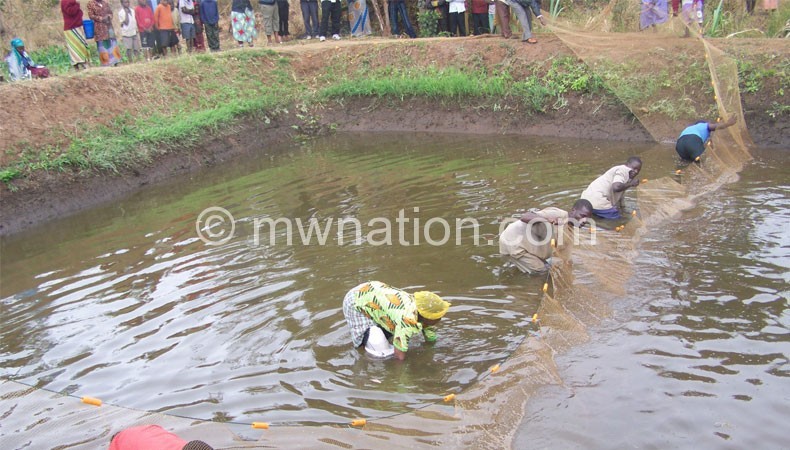Can Malawians build on safety net programmes?
Despite the recent donor fatigue, Malawi has continued to enjoy substantial support from development partners (DPs).
These donor partners, who come in various forms and sizes, have remained faithful to their commitment of mobilising and investing huge financial resources in various social and economic interventions to improve the living standards of poor Malawians.
They were handy when thousands of Malawians suffered one of the worst flooding in 2015 and its subsequent dry spell early 2016.
Through the Local Development Fund (LDF), government and DPs introduced social safety nets to save victims from starving to death.
LDF is implementing a productive safety nets Public Works Programme (PWP) through Malawi Social Action Fund (Masaf IV). The intervention is targeting vulnerable communities in Nsanje, Blantyre, Zomba, Machinga, Dowa, Dedza, Ntcheu, Chitipa and Mzimba, among others, and its major objective is to reduce the shocks that come with deforestation and adverse effects of climate change.
Climate change is one challenge majority of Malawians are facing in their daily life today.
Climate change has brought about many effects, including land degradation, which has affected dozens of households, bringing biodiversity loss, reduced availability of clean water, food insecurity and greater vulnerability to the harsh impacts on human life.
Thus, LDF head of development communications Booker Matemvu says the social safety nets programme aims to provide transfers to poor households through participation in community-driven public works thereby creating assets and providing temporary employment in the same communities for specified timeframes.
Matemvu says LDF is, therefore, supporting various large-scale rehabilitation of degraded land, for sustainable and productive use, and build the capacity and resilience of communities against adverse effects of climate change.
“Through the natural resource management component, communities are having their capacities built to tackle effects of climate change on their own even after the project phases out.
“This component facilitates beneficiary communities to actively plant trees and/or manage their natural resources to ensure that the amount of land resources that a household, society or country depends on for ecosystems services such as water, remains healthy, productive and stable,” he explains.
The fund also complements and leverages existing initiatives by creating a link between the bottom up approach (projects already developed on the ground) and the top down initiatives (government targets, institutional initiatives).
While the local resolve could be resonating well with target 15.3 of the Sustainable Development Goals (SDGs) as adopted by the United Nations (UN) in September 2015 in New York, not all Malawians know specifically these initiatives aim to achieve.
Testimonies and interviews from beneficiaries give an impression that beneficiaries believe donors shall forever be there to provide for them through safety net programmes.
So, can Malawians build on safety nets programmes to reduce poverty?
Matemvu says the fund is aware of the fact that it is high time Malawians started strategising on how to sustain themselves in case of donors packing and going back to their countries.
“That’s why, we always emphasise community-facilitated projects to ensure there is ownership by the targeted communities,” he explains.
Chairperson of Chimwavi Irrigation Scheme of Chasemphana Village in traditional authority (T/A) Nsomba in Blantyre, Isack Fayele, says through financial and technical support they got from LDF, the scheme has significantly increased food production.
“Food production among households that had their fields washed away due to flooding last year has greatly improved. And from the look of things, our scheme could soon be a bread basket for the district if members do not backslide in their efforts,” boasts Fayele.
He, too, holds the opinion that time is already running out for Malawians to start deciding and controlling their destiny for the achievement of sustainable development.
“LDF is doing a commendable job to build our resilience and cushion our shocks. But this will remain unsustainable even if donors decide to triple their financial support.
“We will not achieve the much-desired development if we choose to be perpetual beneficiaries of social safety net initiatives,” he emphasises.
Anna Ndhlovu of Hannock Lukhele Village in Inkosi Mzikuola’s area in Mzimba is a beneficiary of the social safety nets programme.
She, too, concurs with the idea that locals should start owning development projects being initiated with funding from DPs.
But Ndhlovu challenges duty-bearers both at the council and Capital Hill should lead by example by complying with the basic principles of transparency and accountability in the implementation of various development projects.
A resident of Jenda Rural Growth Centre, Nixon Zimba, states that unless duty-bearers and political leaders abide by these principles, beneficiaries will not see the importance of weaning themselves from handouts.
“These donor-funded development projects are very critical to a poor nation like Malawi. But we need to own and build ourselves on them to go to the next level.
“We can’t expect LDF to be resident here and giving us everything. Even donors have timeframe to their benevolence,” says Zimba.
Spoon-feeding in the long run teaches us nothing but the shape of the spoon, a British novelist, essayist, and social and literary critic Edward Morgan Forster once said.





